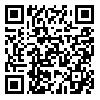

BibTeX | RIS | EndNote | Medlars | ProCite | Reference Manager | RefWorks
Send citation to:
URL: http://jdisabilstud.org/article-1-3647-en.html
2- Assistant Professor, Department of Psychology, Isfahan (Khorasegan) Branch, Islamic Azad University, Isfahan, Iran
Abstract
Background & Objectives: Histrionic personality disorder is considered one of the types of personality disorders that a group of people in society suffer from. The prevalence of this disorder has been reported to be higher among women than men. Women play a pivotal role in the stability and quality of marital relationships, and their psychological well–being has a significant impact on the dynamics and satisfaction within these relationships. Among various personality characteristics, histrionic behaviors—characterized by attention–seeking, emotional exaggeration, and dramatic interpersonal expressions—can lead to maladaptive relational patterns, resulting in marital dissatisfaction and emotional exhaustion. Another key variable in married life is resilience, a capacity that plays a crucial role in coping with psychological pressures and life stresses. Marital burnout, as a psychological outcome, is closely associated with both individual mental health and overall marital quality. Given the potential negative impact of histrionic behaviors on spousal relationships and the scarcity of research on effective interventions for this population, the present study aimed to investigate the effectiveness of mode deactivation therapy (MDT), also referred to as style deactivation therapy, in reducing marital burnout and enhancing resilience among married women exhibiting histrionic traits.
Methods: This quasi–experimental study employed a pretest–posttest design with a control group. The target population included married women with observable histrionic behaviors who sought consultation at family counseling centers in Isfahan City, Iran. Forty eligible participants were recruited voluntarily and randomly assigned to two groups: experimental (n = 20) and control (n = 20). The inclusion criteria for the study subjects were as follows: married women, no history of mental disorders, literacy, no use of other psychological interventions, and willingness to participate in the study. The exclusion criteria for the subjects were non–response to the questionnaire, severe illness, use of psychiatric medications, and absence of more than two sessions in the experimental group.
In the present study, all ethical considerations related to human studies were observed. Participants were informed of the study's aims, methods, duration, and nature before entering the study, and written informed consent was obtained from them. Participants were also assured that they could withdraw from the study at any time without any negative consequences. Participants' personal information and research data were kept confidential and used only for research purposes. Data collection instruments comprised the Marital Burnout Scale (Pines, 1996) to assess marital burnout and the Connor–Davidson Resilience Scale (CD–RISC) (Connor & Davidson, 2003) to measure resilience. The experimental group participated in ten 90–minute sessions of mode deactivation therapy, which focused on identifying and modifying maladaptive cognitive and behavioral patterns, restructuring dysfunctional core beliefs, and enhancing emotional regulation and coping skills. The control group received no intervention during the study period. Data analysis was performed using multivariate analysis of covariance (MANCOVA) and univariate analysis of covariance (ANCOVA) at a significance level of 0.05, as determined by SPSS software version 26.
Results: The results showed that mode deactivation therapy significantly reduced marital burnout (p < 0.001) and increased resilience (p=0.009) in women with histrionic behaviors. Based on the eta square, 49% of the difference between the two groups in the marital burnout variable was related to the implementation of style deactivation therapy for the experimental group, which was confirmed with 98% power. Also, 21% of the difference between the two groups in the resilience variable was related to the implementation of style deactivation therapy for the experimental group, which was confirmed with 88% power.
Conclusion: Overall, this study provides evidence that mode deactivation therapy is an effective psychological intervention for reducing marital burnout and enhancing resilience among married women exhibiting histrionic behaviors. The findings highlight the importance of targeted, evidence–based interventions to address relational dysfunctions associated with specific personality traits.
| Rights and permissions | |
 |
This work is licensed under a Creative Commons Attribution-NonCommercial 4.0 International License. |


